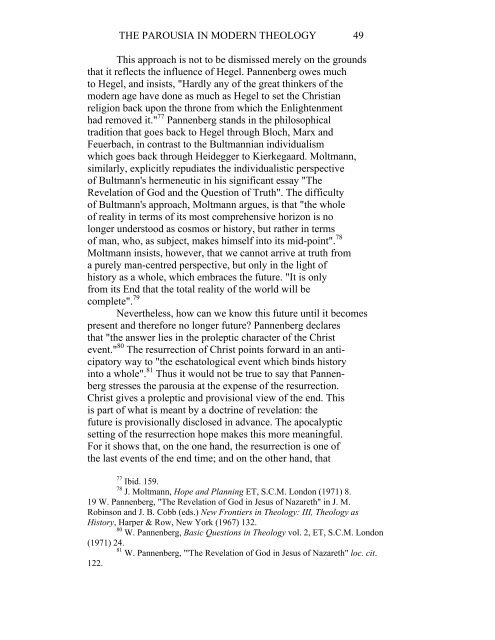the parousia in modern theology: some questions ... - Tyndale House
the parousia in modern theology: some questions ... - Tyndale House
the parousia in modern theology: some questions ... - Tyndale House
Create successful ePaper yourself
Turn your PDF publications into a flip-book with our unique Google optimized e-Paper software.
THE PAROUSIA IN MODERN THEOLOGY 49<br />
This approach is not to be dismissed merely on <strong>the</strong> grounds<br />
that it reflects <strong>the</strong> <strong>in</strong>fluence of Hegel. Pannenberg owes much<br />
to Hegel, and <strong>in</strong>sists, "Hardly any of <strong>the</strong> great th<strong>in</strong>kers of <strong>the</strong><br />
<strong>modern</strong> age have done as much as Hegel to set <strong>the</strong> Christian<br />
religion back upon <strong>the</strong> throne from which <strong>the</strong> Enlightenment<br />
had removed it." 77 Pannenberg stands <strong>in</strong> <strong>the</strong> philosophical<br />
tradition that goes back to Hegel through Bloch, Marx and<br />
Feuerbach, <strong>in</strong> contrast to <strong>the</strong> Bultmannian <strong>in</strong>dividualism<br />
which goes back through Heidegger to Kierkegaard. Moltmann,<br />
similarly, explicitly repudiates <strong>the</strong> <strong>in</strong>dividualistic perspective<br />
of Bultmann's hermeneutic <strong>in</strong> his significant essay "The<br />
Revelation of God and <strong>the</strong> Question of Truth". The difficulty<br />
of Bultmann's approach, Moltmann argues, is that "<strong>the</strong> whole<br />
of reality <strong>in</strong> terms of its most comprehensive horizon is no<br />
longer understood as cosmos or history, but ra<strong>the</strong>r <strong>in</strong> terms<br />
of man, who, as subject, makes himself <strong>in</strong>to its mid-po<strong>in</strong>t". 78<br />
Moltmann <strong>in</strong>sists, however, that we cannot arrive at truth from<br />
a purely man-centred perspective, but only <strong>in</strong> <strong>the</strong> light of<br />
history as a whole, which embraces <strong>the</strong> future. "It is only<br />
from its End that <strong>the</strong> total reality of <strong>the</strong> world will be<br />
complete". 79<br />
Never<strong>the</strong>less, how can we know this future until it becomes<br />
present and <strong>the</strong>refore no longer future? Pannenberg declares<br />
that "<strong>the</strong> answer lies <strong>in</strong> <strong>the</strong> proleptic character of <strong>the</strong> Christ<br />
event." 80 The resurrection of Christ po<strong>in</strong>ts forward <strong>in</strong> an anti-<br />
cipatory way to "<strong>the</strong> eschatological event which b<strong>in</strong>ds history<br />
<strong>in</strong>to a whole". 81 Thus it would not be true to say that Pannen-<br />
berg stresses <strong>the</strong> <strong>parousia</strong> at <strong>the</strong> expense of <strong>the</strong> resurrection.<br />
Christ gives a proleptic and provisional view of <strong>the</strong> end. This<br />
is part of what is meant by a doctr<strong>in</strong>e of revelation: <strong>the</strong><br />
future is provisionally disclosed <strong>in</strong> advance. The apocalyptic<br />
sett<strong>in</strong>g of <strong>the</strong> resurrection hope makes this more mean<strong>in</strong>gful.<br />
For it shows that, on <strong>the</strong> one hand, <strong>the</strong> resurrection is one of<br />
<strong>the</strong> last events of <strong>the</strong> end time; and on <strong>the</strong> o<strong>the</strong>r hand, that<br />
77<br />
Ibid. 159.<br />
78<br />
J. Moltmann, Hope and Plann<strong>in</strong>g ET, S.C.M. London (1971) 8.<br />
19 W. Pannenberg, "The Revelation of God <strong>in</strong> Jesus of Nazareth" <strong>in</strong> J. M.<br />
Rob<strong>in</strong>son and J. B. Cobb (eds.) New Frontiers <strong>in</strong> Theology: III, Theology as<br />
History, Harper & Row, New York (1967) 132.<br />
80<br />
W. Pannenberg, Basic Questions <strong>in</strong> Theology vol. 2, ET, S.C.M. London<br />
(1971) 24.<br />
81<br />
W. Pannenberg, "'The Revelation of God <strong>in</strong> Jesus of Nazareth" loc. cit.<br />
122.

















